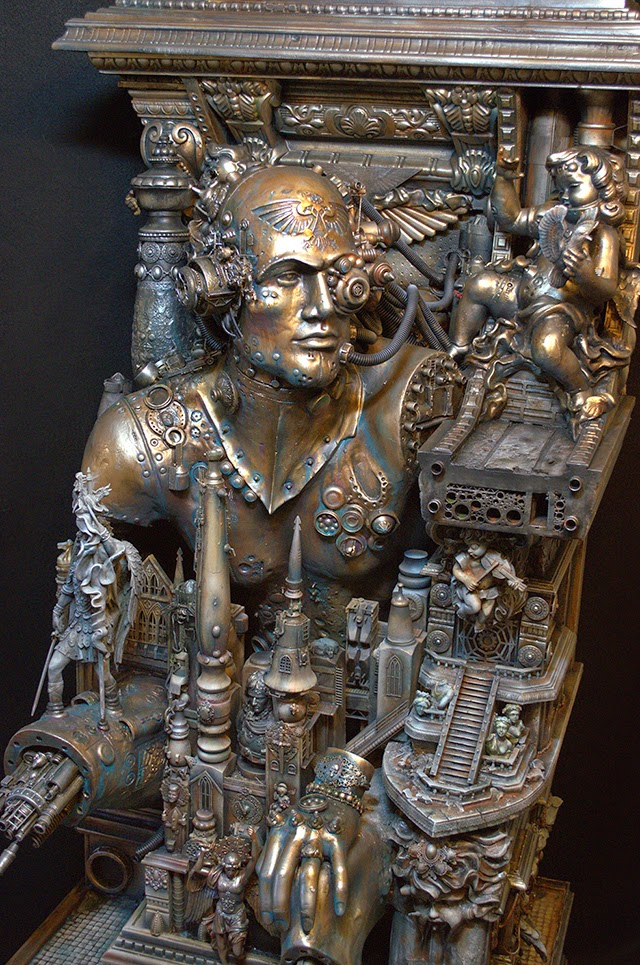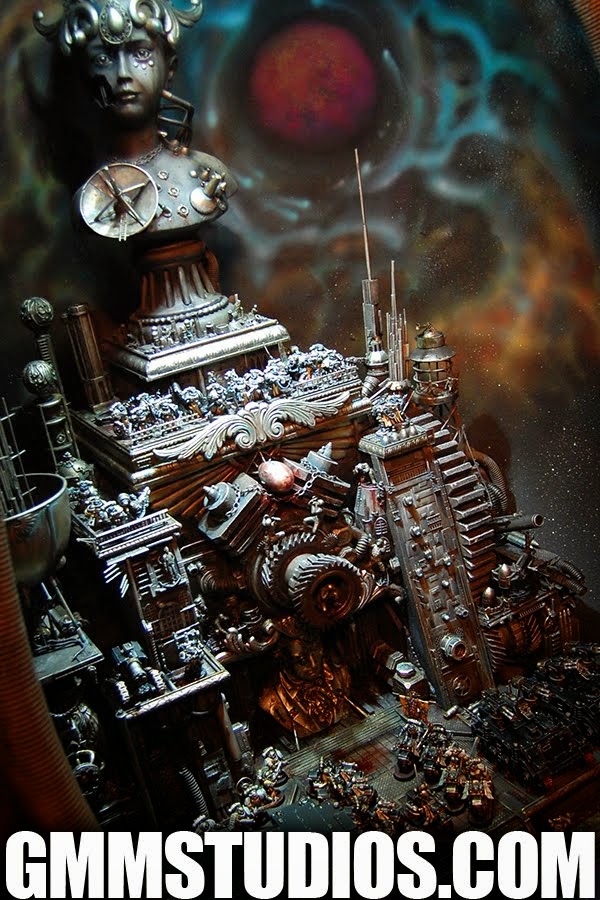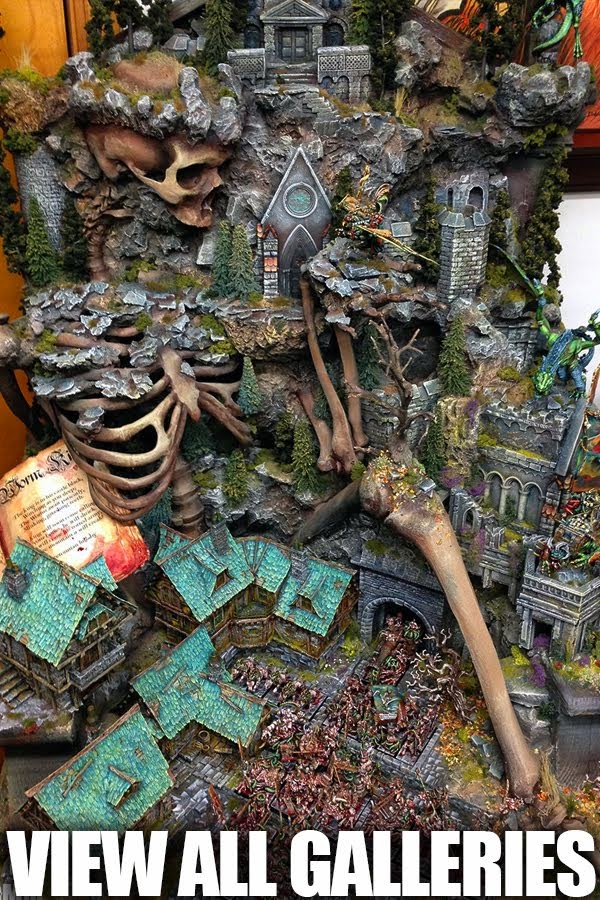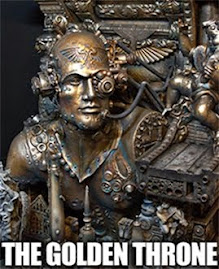Gothic science fiction. Say these words to anyone with an interest in Warhammer, and no matter how long ago, how fleeting that interest was you will undoubtedly conjure from the subconscious an image of a pointed arch surrounded by a baroque behemoth of a futuristic church, emphasis on the industrial. Warhammer has taken this visual theme over the top so far, it is almost cliche to make light of it. It is it's own inside joke, Gothic for it's own sake. Let's consider however the real genius behind the story of the Emperor. Examine that "Gothic" behind the "science fiction" and one can see the irony in the visual of the Gothic, being so excessive, overtaking the depth of the Emperor's tragedy. While we might think it frivolous, being so accustomed to waves of visual decoration, in reality the Imperium and the story of our entombed hero is Gothic in every sense of the word.
With that understood, that we all know the first of the trinity of Gothic representations, the architectural, we should briefly look back at the history of the word in the cultural sense. With roots in Greek boiling down to "outsider," later becoming the Barbarian and Gothic essentially referencing anything foreign, as well as ideas outside good taste and culture. In the Renaissance it became a derogatory term, casting aside the towering spires, encrusted battlements and flying buttresses seen as gaudy and from a less refined era This will lead into the third representation, which one can assume was intentional, it's use in Gothic literature. Over the top and fanciful stories which were outside of normal convention and at the time, good taste. Today, this sense is mirrored in the Gothic of Warhammer. Warhammer is, with all respect, love and devotion of someone who would be willing to make this thing, complete and utter Gothic kitsch to the extreme. Warhammer is an indulgence that cannot be compared to in cheese short of the most hardcore Trekkie, and by Emperor we love it.
The origin of Gothic literature is harder to define, as the form itself much like it's antagonists is a hazy movement somewhere between life and death in the past 200 years. Most pin it to Horace Walpole, writer of Castle of Otranto and builder of Strawberry Hill, which is less infamous but equally as Gothic. Strawberry Hill was a place of decadent improvisation. Gothic in architecture and act of creation; Walpole built it for sake of itself, and improvised his Gothic novel at the same time within it. It's purpose was to celebrate itself. Many ideals coalesce into another that is more than the sum of it's parts. As a son the first Prime Minister and member of Parliament, he found himself with time to build for the fun of it, for the look of it, because he could.
If this were the sort of structure to come from Walpole's mind, then the setting of his first Gothic novel and from then on the style as a whole, would be equally as important. Absolutely, setting is one of the most important and fundamental aspects of the Gothic. Castles, churches, and massive mountains each being different in form but in presence they are the same - a treacherous place. The setting itself is an antagonist in the story, an oppressive cavern that is dangerous to enter; one fears getting lost, falling to one's death, or being buried alive. They are often beautiful to admire, but also oppressive and instill fear into the protagonist and reader. One feels a sense of claustrophobia, a fear of imprisonment in hostile and ambiguous architecture. And on another level a fear of being imprisoned in our own mind, being forced to deal with the deep dark places we have surrounded ourselves with.
Life and death are important themes in the Gothic. What is dead cannot be laid to rest. The theme of everlasting life, except with the twist it isn't quite what we expected or hoped it to be. It is both a curse and a blessing in the Gothic, with the power to live forever comes great loss, tragedy and sacrifice. Condemned to a twisted version of a former form, these characters often in finding everlasting life, wish for it to finally end but cannot due to obligation.
Bringing the dead back to life is the central focus of Shelley's Frankenstein. A novel in the Gothic mode, considered by many to be the first science fiction novel, the book is a testament to how easily the two blend together. In the novel Frankenstein gives his monster undeath, return to life, that being the great taboo and in history seen as something reserved for god. The resurrection of Jesus can be seen as a direct proclamation that this is restricted to god, and not mortals. So it is easy to understand why it is such an important theme in a literary movement surrounded by Christianity. The variation to Frankenstein is the use of science over religion or magic, at the time a new form of power and forbidden knowledge, moral being it should be respected equally and for the same reasons, despite the difference in source of condemnation - nature versus god.
The threat of condemnation often follows this concept of forbidden knowledge. The notion of forbidden knowledge spans much of human literature over time, but in the case of the Gothic represents something taboo. Something that if understood or used could bring ascension to the level of the gods, but with great cost. We should not forget the subtitle to Frankenstein - "The Modern Prometheus." Prometheus was a god of Greek myth who saw the plight of man and, by stealing away fire and giving it to humanity, sacrificed himself to be eternally chained to a rock and feasted on by crows. The tragedy being, his great sacrifice was followed by his eternal imprisonment. As readers we find ourselves sympathizing with these characters. Despite the transgression, we might still wish peace upon them from a suffering we cannot truly understand as mortals.
All of these principles that help form the Gothic are overshadowed by it's most core - the sublime. Edmund Burke in his 1757 treatise on aesthetics, compared beauty and the sublime on equal terms and fleshed out the idea for the first time. Burke brought forward that while beauty was everything aesthetically pleasing; encompassing everything smooth, delicate, symmetrical, there was an equal or sister notion of the sublime. A feeling between terror and awe, it is the response an individual has to a massive waterfall or mountain. Irrational, overwhelming, over the top, the sublime hints at something timeless, something divine.
The sublime is the most critical glue of the Gothic. A work can have the characters, the traditional themes. it can be set in history or space in the far future, but without the sublime it is simply an exercise in theme and narrative. A great comparison - ALIEN and ALIENS. The former was a great work of Gothic fiction in which Scott makes us face our deepest fears and pits the crew against an unseen and seemingly divine being. ALIENS and all further movies essentially being the same movie, with the same tropes and basic ideas, however they are not Gothic. Being an idea that simply cannot be injected, the sublime, the difference lies in the direction, atmosphere and aesthetic. Forgetting the fact that by nature any sequels cannot be as shocking and surprising due to the image of the alien being revealed in the first, most directorial choices and guns blazing style simply doesn't leave room for suspense and true horror. Regardless, ALIEN stands as the pinnacle of Gothic science fiction in modern time.
Therefore we see Burke was correct, the sublime is not something tangible. It isn't something, unlike beauty, that can be measured, divided mathematically, compared and discussed. It's power is that it simply is, and one has no control over it. Fear and impression defies taste, preconceived notions, and bias. It goes beyond other modes of simply having a mood though. It isn't good and evil, black and white, action and good deeds affirmed. It is ambiguous in every way. makes us uncomfortable at a primordial level that is hard to define. It takes our most primal fears and presents them to us as a mountain cresting over the protagonists horizon. Sexuality, fear of death, the uncanny valley, by testing and toying with these lines an unnerving power is added to the Gothic. The appeal is the allure mixed with the forbidden. The sublime is therefore the glue that holds the Gothic together, without these tested boundaries and questioning of perception and reality, simply being an exercise in visual theme, an action movie with a clear beginning and conclusion and nothing more.
I suppose it would be my duty, in conclusion, to return these ideas to the story of the Emperor. To illuminate without question what makes the story so appealing and truly Gothic as attested earlier. It would be much more appropriate, wouldn't it, to leave it as ambiguous as the future of our protagonist, and humanity, in the 41st Millennium. After all, the only thing certain, is in the grim darkness of the far future, there is only war.
On History (Or, Why No Marines?)
Anyone who has thought about the background of the Warhammer universe has considered the years between modern time and the 31st millennium. In my own daydream's conclusions, it goes back to one notion:
What if Gavrilo Pricip never shot Franz Ferdinand in that side street 100 years ago? What if the first assassins bomb was a dud and injured no one? What if Ferdinand's driver simply asked for directions? I could keep going, but the general question leaves a lot of room for potential differences. In a different timeline, an alternative universe, Ferdinand lives. The powder keg of early 20th century politics simply never goes off, but slowly deflates. Highly unlikely, but that is how these things go. When you think about it, the assassination is just as unlikely a scenario. However this could mean a potential 20th century devoid of war. 35 million people do not die in WW1. Hitler is just a failed artist and lives out his days in (albeit grumpy) peace. A double eagle banner flies over Vienna in 2015, a cosmopolitan capital of a European Union and possibly including Russia to the Pacific with some revolution potentially being averted.
Now that we have a basis, let's reverse engineer from the known beginnings of the Imperium in the 41st Millenium. Take the double eagle, a relative union of humanity, and stories of great unification wars. Draw lines between the two and there is certainly possible pathways for something out of Europe to create the legacy of the Emperor. This theory is the inspiration for the roof. These are statues and relics of the lineage of the Emperor taken from the surface and mounted above the Emperor, to eternally watch over him. Permanently mounted in a new space unreachable.
Some might ask "why no Space Marines?" It is true that Marines are critical to the story of the Emperor, however a king does not honor his grandsons on his own personal throne, but his ancestors. The throne would also not likely be built of any STC technology and thus would be original and to the tastes of the Emperor specifically. This is an omnipotent god-emperor; he would not be confined to the same geometry and basics designs of the Imperium.
On Technique
The Throne basis is composed of wood, with a mannequin seated. Built over top with clay and attached mixed model parts, jewelry, toys, figures, and wood and plastic stock. The sculpture was then primed with metallic spray and then painted with a #4 brush. That #4 brush saw it's birth and retirement in the scope of this project and is entombed in the back of the mannequin.









































